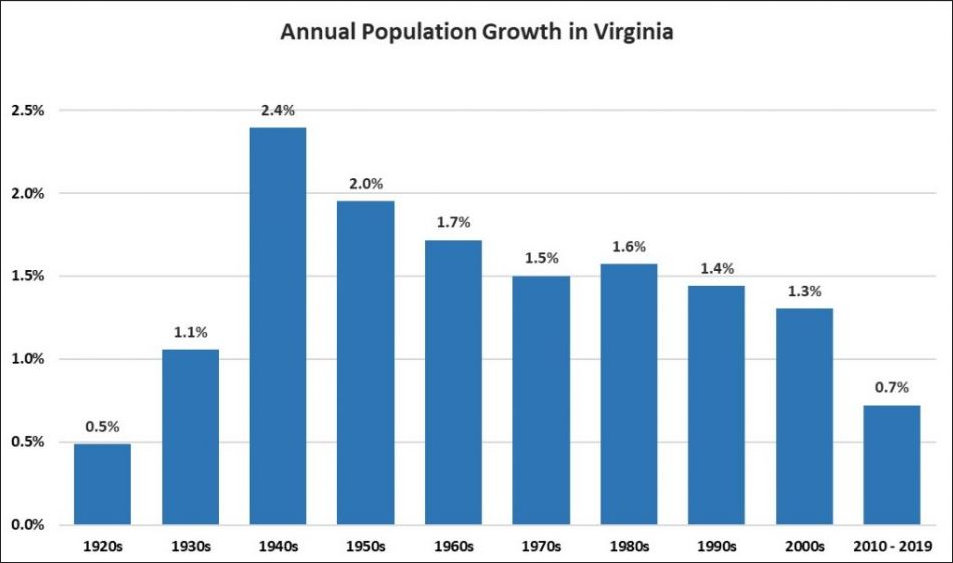
by James A. Bacon
Virginia’s annual population growth has slowed to the lowest rate since the 1920s, according to the University of Virginia’s Demographics Research Group. In the past decade, the 2010s, the population growth fell by almost half — from a 1.3% rate to a 0.7% rate in the 2000s. There is no evidence, as the population ages, as Millennials struggle to gain their economic footing, and as fertility rates decline, that this trend is likely to reverse itself.
Nor is there any evidence that state lawmakers comprehend the economic and fiscal implications of this seismic change.
On the positive side, a stagnant population should ease the inevitable strains associated with new growth and development. There will be fewer children to educate, fewer kids to send to college, less traffic, less energy consumption, less waste to recycle, and the less water consumed than would have been the case if population had continued growing at the previous pace. In other words, the demand for new infrastructure will ease considerably, providing relief to Virginia’s fast-growth localities.
On the negative side, a slower overall rate of population growth translates into many counties as negative growth. In 2018, 64 of Virginia’s 95 counties had more deaths than births. A declining population and a declining tax base makes it difficult for local governments to support the infrastructure, level of services, and financial debt geared to a larger population in the past. The fiscal stress on populations with shrinking populations likely will get worse, not better.
Many state agencies engage in long-term planning. The Virginia Department of Education must anticipate K-12 enrollment growth to plan for the construction of new schools. Public colleges and universities also must project future enrollment growth, which is largely influenced by the number of students coming through the K-12 pipeline, to plan the expansion of higher-ed programs and facilities. The Virginia Department of Transportation must forecast where traffic increases will occur and how much money will be needed to meet the demand for mobility and access. And the list goes on… The assumptions underpinning all of these forecasts need to be revisited and updated.
Another concern is that a slower rate of population growth translates into a slower rate of economic growth. It’s nice to have fewer demands on education and infrastructure, but fewer people means slower growth in the economy and in tax revenues. Economic growth has two primary drivers: population and productivity. A stagnant population kicks out one of the main props of economic expansion.
We can cross our fingers and hope that the Amazon HQ2 project will goose Northern Virginia’s population and economic growth as the promised 25,000 jobs materialize. But there’s not much prospect of Amazon doing anything to stimulate the economy in RoVa. As far as the General Assembly is concerned, there’s no excuse for doing business as usual. As lawmakers in Richmond dream up endless ways to spend more money, they need to consider the implications of a slow-growth population for both the economy and the state’s fiscal resources.

Leave a Reply
You must be logged in to post a comment.